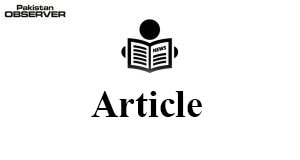How Taliban secure recognition
SINCE their swift takeover of Kabul, the Afghan Taliban began facing a host of challenges on internal and external fronts.
Someone rightly said that ‘it is possible to seize Afghanistan but it would be an uphill job to run its complicated affairs’’.
No single state has recognized the Taliban as a government yet even Islamic countries as Pakistan, Iran and Tajikistan are still reluctant to officially establish ties with Kabul.
To secure global legitimacy, Taliban have made trips to China, Russia, Uzbekistan and Qatar and met with the US and the EU’s representatives.
In this regard, Kabul needs not only to have ties with Pakistan and Iran but Russia and China’s recognition as global powers is inevitable for the Taliban-led government.
In the early days of the Taliban’s rule, Moscow and Beijing showed willingness to see Afghanistan as a recognized state who has badly suffered from the US double standard policies in the last two decades.
In those days, Russian Ambassador to Kabul Dmitry Zhirnov publicly admitted that “the new government was better than the previous one” and President Vladimir Putin asked the world to establish good ties with Taliban-led government.
Moscow briefly changed its tone towards Taliban by raising questions about Taliban’s inability to counter ISIS in the country when the ruthless Khurasan Chapter of ISIS carried out some devastating bombings in Kanduz and Kandahar provinces in the early weeks of October.
As an active player in the global politics, Russia never wants to keep distance from Afghanistan where its interests could be jeopardized by its rivals.
Russia arranged a meeting with the ruling Taliban on 20 October to find out a comprehensive strategy for the future of Afghanistan.
The meeting which was also participated by ten countries including Pakistan and China, is expected to push the stalled Afghan affairs forward.
On the other hand, President Putin has recently made it clear that “Moscow is reaching out close to decide the Taliban’s recognition as a state.
Besides, Putin hinted that Taliban could possibly be removed from terrorists’ list and said that the frozen assets of Afghanistan should be released”.
On the other hand, both China and Pakistan are quite interested to establish ties with Emarat-i-Islami Afghanistan but they can’t dare to take the first step in this regard. Beijing and Islamabad may take such a step when Russia clears its final stance towards the Taliban.
Although, Iran had a relaxed approach about the Taliban government but it has some reservations over the formation of partial cabinet and insecure Shia brethren in the country.
The United States’ policies are still frustrated and biased towards the ruling Taliban. Washington had unlawfully frozen $9.5 billion assets of the Afghan Central Bank that has led to further crisis in the country.
Washington is also pursuing a do more policy in the case of human rights provision and women inclusion in the Cabinet.
There is no denying that Taliban have demonstrated flexibility in the case of human rights provision, however, the US and other European countries view this relaxation just a lip service.
Taliban hesitate to totally fulfil all the promises that they had made in the beginning to install a complete inclusive government and include women in the Cabinet, because such steps are likely to lead to internal reaction among their ranks.
As well as, the ruling but inexperienced Taliban seem quite helpless before growing human crisis in the country as the people have been suffering immense financial, health and educational issues since the ousting of Ashraf Ghani-led government.
The helpless people are seeing towards international aid on humanitarian grounds and with the departure of previous government, mostly of the state institutions collapsed, especially, the national army not only badly scattered, but it lost its image.
A large number of soldiers either surrendered to the Taliban or had to shelter in neighbouring countries.
In order to rebuild an army, Emarat-i-Islami needs to bring fugitive soldiers who already acquired training under the US during its two-decade prolonged presence in the country.
In addition, the law and order situation in the country can’t be described satisfactory as a IS-Khurasan Chapter has ability to pose a threat not only to the government but its can put the peace of the entire region at stake.
Being an inevitable pillar of the state, media can play a crucial role in the progress of state, however, reports cite that many journalists left the country feeling themselves insecure and more than one hundred media outlets quit their operational activities since the rise of the Taliban due to lack of funds.
To fend off the above mentioned crisis, Taliban should soften international mood by ensuring zero tolerance for terrorist outfits in the country, provision of human rights and women rights to education and politics as well.
Furthermore, the government of Emarat-i-Islami must provide tough security to Shia minority who have been targeted twice in the last two months.
—The writer is a lecturer at degree college Zhob, Balochistan and columnist.










